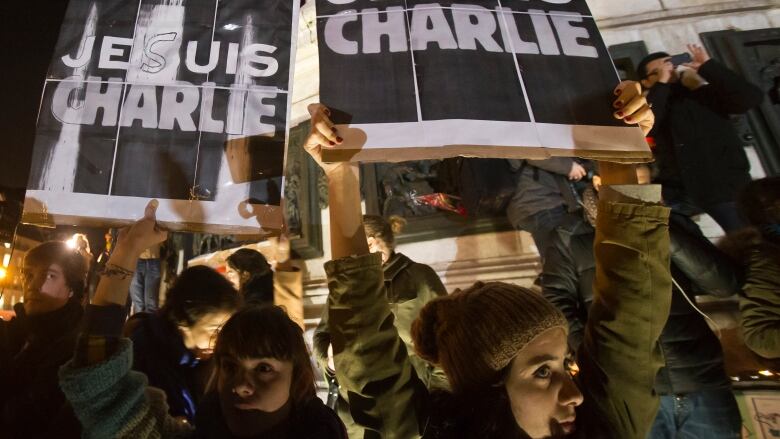Charlie Hebdo shooting: Debate over publishing the Muhammad cartoons
'No hesitation' for some media, while others keep a careful distance

When gunmen launched a deadly attack in the Paris-based office of Charlie Hebdo, a weekly satirical paper with a history of publishing cartoons lampooning radical Muslims and the Prophet Muhammad, the Washington Free Beacon says it didn't think twice about publishing those illustrations.
"We went right ahead with it. No hesitation," says Lachlan Markay, a reporter who wrote a story about the attack for the Washington-based news website.
- Listen to a debate on publishing the Muhammad cartoons on CBC's The Current
- Politicians join debate over publishing cartoons
"If it were just someone submitting that cartoon for publication in the everyday operations of the newsroom, it would be perfectly fine to decide it wasn't in good taste, it was too offensive. But I think that all went out the window the minute those gunmen broke into the offices."
The Free Beacon reasoned that the Charlie Hebdo cartoons of the Prophet Muhammad had become news when people were killed for running them, Markay said.
Caving to fanatical demands
"I think to decide not to show them even after those people were killed is essentially caving to the fanatical demands of the people who went in and shot up that office," Markay said.
But many newsrooms around the world struggled with the decision about publishing the images. While many papers published editorial cartoons in support of Charlie Hebdo and free speech, some of those same periodicals refused to publish any of the Muhammad cartoons.
- Live blog: Charlie Hebdo shooting: Live updates from Paris
- Who are the Kouachi brothers, suspects in Charlie Hebdo shooting?
- What we know about the victims
- Watch | Why hasn't CBC shown Prophet Muhammad caricatures?
Some called it a cowardly decision.
"I think the idea of cowardice is really interesting," said David Studer, CBC's director of journalistic standards and practices. "Because I think if you are saying us not running these things means the bad guys win, my view is that remaining civilized and sticking to our principles is what defeats bad guys, not giving in to the emotion of the moment."
Studer said the CBC decided against running the cartoons, arguing that to show those depictions of Muhammad would needlessly offend Muslims, who consider such depictions sacrilege.
And he wasn't alone in putting forward that argument. The New York Times executive editor Dean Baquet told the paper's public editor he spent about half of the day deciding whether or not to publish the cartoons, changing his mind twice before ultimately deciding not to run the images.
'Gratuitous insult'
“We have a standard that is long held and that serves us well: that there is a line between gratuitous insult and satire. Most of these are gratuitous insult," Baquet said.
The Washington Post ran one image on its editorial pages while the main U.S. networks, including ABC News, CNN and Fox backed off from publishing the cartoons. The Associated Press also declined to make them available.
In Canada, of the Toronto-based newspapers, only the National Post ran the controversial cartoons. Almost none of the U.K. papers ran the cartoons, nor did the BBC and the Paris-based papers Le Monde or Le Figaro.
"I think not wanting to offend people is a perfectly fine attitude, but the notion that the primary sort of driver of newsroom policy should be to not offend people I think is very misguided. and I think there are concerns that must override that in situations like this," Markay said.
The German newspaper BZ printed 43 covers that Charlie Hebdo had printed over the past years. In Denmark — where Jyllands Posten published several cartoons mocking Muhammad in 2005, igniting protests across the Muslim world — four newspapers republished cartoons from the French newspaper. (Jyllands Posten, whose staff have been under police protection since their cartoon controversy, decided not to publish the Charlie Hebdo cartoons.)
Canada's own satirical magazine Frank published cartoons, as did Quebec's major French-language newspapers, who jointly published a Charlie Hebdo editorial cartoon of Muhammad "to demonstrate support for the fundamental principles of freedom of expression."
Images of the Muhammad cartoon could also be found on the Global News website, but CTV News would not comment on its policy. Meanwhile, CBC's French service, Radio-Canada, took a different approach than its English counterpart and chose to run the cartoon on TV and its website.
Michel Cormier, Radio-Canada's executive director of news and current affairs, said the image was used sparingly, and with the intention of providing context to the events unfolding in Paris.
Images not needed to understand story
Studer said he disagreed that those images are needed to understand the story.
"The fact that they existed is what provoked this. Not how outrageous they were or how provocative they were but that there were images at all."
Some argued that news organizations were pandering to the Muslim community but have had no qualms about running content that might insult other religions.
"It is in my view concerning, if our national broadcaster arbitrarily decides that some faiths can be subject to comedic interpretation, whereas others are exempt or otherwise deemed to be 'off limits,'" British Columbia Conservative MP Dan Albas said in his blog, referring to the CBC's long tradition of satire.
But Studer said the decision to not publish a Muhammad cartoon didn't mean the CBC was playing favourites with some religious groups.
"A part of our job as Canada's national broadcaster is to promote tolerance and respect and to recognize that unlike some other religions, where you see statues and you see pictures of deities, it's one of the tenets of Islam that the Prophet not be depicted in pictures or cartoons," Studer said.
With files from Kady O'Malley, Reuters